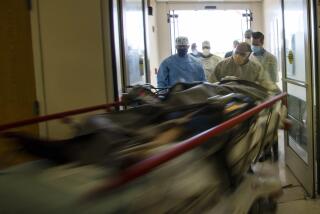Saying no to surgery
Thom McDaniels is no stranger to surgery. As a longtime athlete and high school football coach, he’s spent years putting his knees through the wringer. After injuring his right knee again during football practice, he was told by an orthopedic surgeon that it was time for reconstructive surgery.
Reluctant to undergo a seventh knee surgery, he tried a lightweight knee brace that wraps around his leg from the thigh area to just below the knee. It changed the Ohio coach’s life.
“It’s like somebody turned a light on,” he said. “I don’t have to be conscious about how I move. That’s a new experience for me.”
Healthcare experts say McDaniels’ experience highlights a nationwide need to curb unnecessary surgery and cut back on a range of over-prescribed medical tests and procedures.
“Roughly 30% of the money we spend is on things that are unnecessary or don’t really help patients or add value,” said Dr. Christine K. Cassel, chief executive of the American Board of Internal Medicine a Philadelphia nonprofit that certifies internists.
Unnecessary treatment isn’t just a threat to our wallets but can also cause physical danger, she said.
“There is no medical test or treatment that is completely without risk, and we tend to forget about that part of the equation.”
In addition to certifying doctors, Cassel’s organization is pressing for better doctor-patient communication to avoid unnecessary treatment. Its foundation has an initiative called the Choosing Wisely Campaign.
The campaign’s website includes links to lists of questions for doctors and patients to consider, many of them dealing with medical tests and procedures as well as “patient-friendly” resources.
One reason medical services are overused is the availability of insurance to pay much of the bill, said Dylan Roby, a UCLA health-policy expert.
“People who have access to insurance coverage are faced with incentives that don’t make sense in terms of how they seek care,” he said. “If you have insurance, you may go to the emergency room for an avoidable reason just because it’s more convenient and because you are financially isolated from the loss.”
Experts say the key to avoiding unnecessary care or an inaccurate medical diagnosis starts with constructive conversations between patients and their doctors.
Ask whether a test is really needed. Simple questions can make a big difference, such as asking your doctor: Do I really need this? What’s the risk of having it? What’s the risk of not having it?
“That’s a very legitimate discussion between a doctor and a patient that doesn’t have to involve the insurance companies or the government or anybody else,” Cassel said.
The Agency for Healthcare Research and Quality provides patients with an important resource through its Questions Are the Answer Campaign . By logging onto its website, you can find tips about how to prepare for doctor visits, including questions to ask.
Question your diagnosis. Studies show that as many as 15% to 26% of patients end up getting an incorrect diagnosis, said Evan Falchuk, vice chairman of Boston-based Best Doctors Inc., a service offering second opinions on medical cases. According to the Journal of Clinical Oncology, the misdiagnosis rate for some cancers is as high as 44%.
Don’t simply accept a diagnosis as the final word, especially if prior treatments have proved ineffective. Simply asking “What else could this be?” can encourage your doctor to consider other options, Falchuk said.
“Questions like that are disruptive in a good way,” he said.
And if you’ve had a biopsy and your diagnosis is based on your pathology report, he suggested getting it reviewed again.
“Pathology is incorrectly interpreted more often than commonly thought,” he said.
Get a second opinion. Having another physician review your case can shed new light on your condition. But don’t show up and tell the next doctor, “I’ve been diagnosed with this type of illness; what do you think?” Falchuk said. Instead, focus on describing your symptoms so the new doctor can come to his or her own conclusions.
Some people worry about offending their doctors by going further, but they shouldn’t.
“Any physician uncomfortable with a second opinion is a sign you should get a new one,” Cassel said.
Roby from UCLA said insurers generally cover the cost of a second opinion. California law gives those covered by an HMO the right to a second doctor’s take on their condition. Keep in mind you need to stay in your insurer’s network and follow its procedures if the visit is to be paid for.
McDaniels, the coach who still feels a friend’s advice turned out better than his surgeon’s, wishes he had asked more questions about non-surgical options available to him years earlier, he said. “The only regret I have is that I didn’t do this sooner.”
business@latimes.com
Zamosky writes about healthcare and health insurance.






